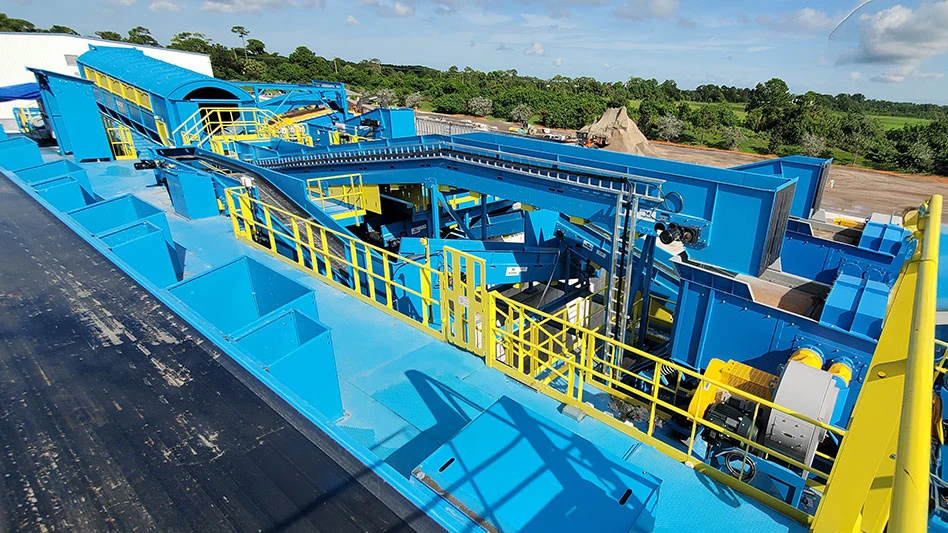Hewlett Packard Co. (HP), Palo Alto, Calif, has announced what it is calling an engineering breakthrough that enables the use of post-consumer recycled plastics in the production of new HP inkjet print cartridges.
The company says more than 200 million cartridges have already been manufactured using the process. HP used more than 5 million pounds of recycled plastic in its inkjet cartridges last year and the company is committed to using twice as much in 2008.
In cooperation with key partners, HP has developed a recycling process that uses multiple sources and grades of recycled plastics, ranging from PET water bottles to returned HP inkjet cartridges.
KEY PARTNERSSince first piloting the process, HP says it has used enough recycled plastic to fill more than 200 tractor trailers carrying 44,000-pound payloads.
"To this point we’ve been able to integrate more than 9 million pounds [of cartridge scrap] into 200 million new inkjet cartridges," according to Ken Fleming, HP director of North American supplies marketing.
Some 5 million pounds was recycled in 2007, and the company’s goal is to increase that figure this year. "We have a pretty lofty goal at HP: In 2008 it’s to double our 2007 figure—so that means 10 million pounds of recycled plastics," says Fleming.
"By developing the technology to use recycled plastics in original HP inkjet print cartridges, we have the opportunity to reduce the environmental impact HP products have on the planet," says Michael Hoffmann, HP senior vice president of supplies, imaging and printing group. "HP’s considerable investments in building a recycling infrastructure made this achievement possible, and this is just the beginning of what we hope to accomplish," he adds.
The company worked closely with resins producer The Lavergne Group (www.lavergneusa.com), based in Montreal, Canada, and Indianapolis-based
In recognition of HP’s inventive approach to using recycled content, the Society of Plastics Engineers (SPE), a trade organization for plastics professionals, will be presenting HP with an environmental stewardship award at the Global Plastics Environmental Conference in March. "HP’s use of recycled plastic in an application as technically demanding as their inkjet cartridges represents an unprecedented engineering innovation," says Larry Koester, vice president of communications, Environmental Division, Society of Plastics Engineers. "This remarkable achievement comes after many years of perseverance and ingenuity by HP and its partners." HP’s overall environmental efforts have earned it recognition as one of Fortune magazine’s "Ten Green Giants" in an April 2007 edition of the publication. More information about the company’s work in relation to the environment is available at www.hp.com/environment.
plastics recycler Butler McDonald (www.butler
HONOR ROLE
macdonald.com) in the multi-year effort to make the process a reality.
Butler-MacDonald played a significant role in executing HP’s vision for a productive recycling solution through its plastic recycling services that enables recovery of high-quality polymers from plastics streams that have often been considered unusable.
Butler-MacDonald has developed technology and processes to take plastic that has been contaminated, poorly recycled or scrapped and create polymers that are ready to be manufactured into a variety of applications. Items such as consumer returns, end-of-life equipment, manufacturing scrap, excess inventories and contaminated resins are being converted into low-cost, high-quality raw material by Butler-MacDonald.
For HP, Butler-MacDonald made it possible to close the loop by removing contaminants from plastic recovered from HP inkjet cartridges and return the material back into the production of original HP inkjet cartridges.
The Lavergne Group is a producer of engineering resins that helped HP develop the recycled plastic formulation (RPET) now used in many original HP inkjet cartridges.
The Canadian company’s contributions for the breakthrough development of the RPET formulation included determining the optimum mix of recycled HP plastic and recycled bottle resin as well as identifying the appropriate recipe of additives that would ensure HP’s strict performance standards were met.
"The Lavergne Group’s patience and dedication throughout this multi-year effort kept the process moving forward and led to eventual success," an HP news release states.
Fleming adds, "We have expertise within HP, but it was vital to partner with folks like Lavergne, with expertise in recycled plastics properties, and Butler-McDonald, with processing knowledge and capacity."
BEYOND RE-USERe-manufacturing and re-using cartridges in printing and copying processes has been taking place for some time, but HP contends that its new process more fully closes the loop.
In developing this process, HP engineers, chemists and partners dedicated themselves to finding a way to provide the environmental benefits of using recycled materials while still delivering the quality and reliability customers need from the product.
Researchers had to consider "a host of engineering specifications to meet our promises on quality and reliability," says Scott Canonico, manager of HP’s environmental policy and strategy.
Canonico notes that the cartridges have to be "functioning after traveling around the world in shipment." Thus, there are "mechanical, thermal and temperature stresses" the cartridges will go through, but all the while, nothing can be allowed to "affect the flow of ink through the tiny nozzles."
Additionally, researchers had to consider the appearance specifications of the cartridge as well as the strength and moldability of the formulated recycled-content plastic.
The challenges were formidable, but years of research and testing have yielded the desired result.
Now, HP inkjet cartridges returned through HP’s Planet Partners program undergo a multi-phase recycling process that reduces them to raw materials, such as plastics and metals. HP combines plastic from the inkjet cartridges with recycled bottle resin and a suite of compounding additives to ensure all recycled materials meet HP’s high-performance standards.
The amount of recycled content in the HP inkjet cartridges can vary from 70 percent to 100 percent of the total plastic used, according to HP, "but the reliability results for each product are stringently tested and consistent across the lineup."
Unlike the remanufacturing process for cartridges, HP has found a way to mold these recycled plastic components into new original HP inkjet cartridges, according to the company.
And HP will need cartridge buyers to take part in the loop by recycling their cartridges. "Consistency of supply and making sure we have systems in place to support what we’re trying to do is critical," says Fleming. "One of the precursors for this effort was launching an inkjet cartridge collection program."
HP’s approach to environmental management of its print cartridges considers every facet of the product life cycle, according to the company, from design to manufacture to recycling.
Using recycled content is one of several initiatives that are part of HP’s Design for Environment program, which is designed to reduce the environmental impact of HP cartridges through material usage, ease of recycling and packaging efficiency.
"This solution is something that HP has been committed to for a very long time," Canonico says. "This particular material and solution is competitive in a host of ways; for a solution to be sustainable, the economics have to work out."
The entire process was hard work, but worth the effort, says Fleming. "To achieve what we’ve been able to do, it took a long time and lot of effort to figure out how to use the recycled materials. We’re very proud at HP of the closed-loop system that we can now use to process the content of our returned packages."
HP’s Planet Partners return and recycling program stretches beyond the North American market, providing free and convenient cartridge returns in more than 45 countries, regions and territories, according to the company. "Customers can be confident in HP’s environmental management because cartridges returned through Planet Partners are never refilled, resold or sent to a landfill," the company states in a news release.
This article includes content submitted by HP. The author is editor-in-chief of Recycling Today and can be contacted at btaylor@gie.net.

Explore the March 2008 Issue
Check out more from this issue and find your next story to read.
Latest from Recycling Today
- Greenwave raises revenue but loses money in Q2 2025
- Recycled steel prices hold steady
- EY says India’s need for scrap imports will continue
- Coming full circle
- Amcor, DCM introduce fertilizer packaging with 35 percent recycled content
- Comstock Metals gets closer to commissioning commercial-scale solar panel recycling facility
- Washington selects Circular Action Alliance as PRO
- Smurfit Westrock expands in Latin America





